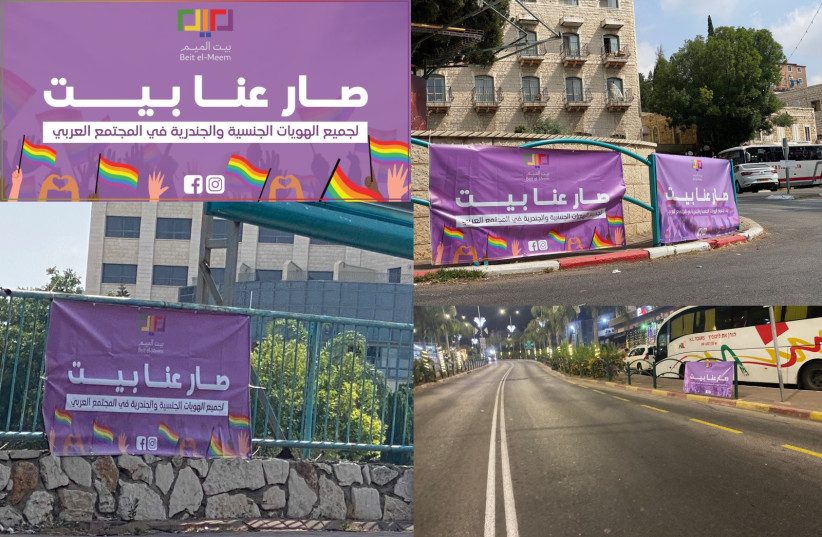Some 83% of LGBTQ+ Israeli Arabs are in the closet and 72% say their families don't support them, according to the first-ever comprehensive study of the LGBTQ+ community among Israeli Arabs.
The study, conducted by the Israeli Institute for Gender and LGBTQ+ Studies at the Agudah - The Association for LGBTQ Equality in Israel, presents an up-to-date picture of the situation of LGBTQ+ people in the Arab sector. The LGBTQ+ community in the Arab sector is estimated to number about 100,000 to 125,000 citizens and the study involved about 167 members of the Arab LGBTQ+ community in Israel.
Of the respondents, 50% said they choose to live their lives completely in the closet, while 33% reported that they were partially out. Only 17% of respondents said they were out of the closet.
According to the study, the main reasons Israeli Arabs chose to stay in the closet were fear of non-acceptance, fear of social and emotional rejection, fear of physical harm, including murder, and a sense of ambivalence around identification with religious or traditional values that do not allow for discussions on issues of sexual or gender identity.
82% of respondents reported that their immediate family does not support them at all regarding their sexual or gender identity. 75% of respondents added that their distant social circles do not constitute a source of support for them either, although 67% said their close circle of friends serves as a source of support for them.

Some 88% of respondents were exposed to or personally experienced LGBTQ-phobia in school, both by students and staff members. 67% of respondents said they experienced LGBTQ-phobia often or almost always at school.
In their neighborhood or city, 84% said that they were exposed to or personally experienced LGBTQ-phobia in their immediate surroundings. Among their family, 80% said they were exposed to or experienced LGBTQ-phobia from parents, siblings or extended family.
When asked if they thought Arab society's attitudes towards LGBTQ+ issues and people could change, 60% said they thought it was possible, while 28% said they did not think it was possible and 12% said they did not know.
'The study rose from the community's desire to understand itself'
"The research grew out of a response to a real need that arose from the field, from the basic desire of the community itself: to understand itself, to make its voice heard, to stop being transparent," said Dr. Sigal Goldin, head of the Israeli Institute for Gender and LGBTQ+ Studies. "Throughout the research process, we worked in collaboration with community activists and the Beit el-Meem organization, which allowed us to reach large sections of the population, most of whom are in the closet."
"The findings indicate unique characteristics, difficulties and challenges faced by this community, the complexity and diversity within the community, fears and anxieties, as well as the inner strength that exists in the community and the desire and hope to get out of various circles of distress and live in equal living conditions," added Goldin.
"In Arab society there is a basic lack of knowledge about the personal experiences that these people go through in their lives."
Naji Daas, a researcher at the Israeli Institute for Gender and LGBTQ+ Studies
"The findings of the study show that in Arab society there is a basic lack of knowledge about the personal experiences that these people go through in their lives from childhood to adolescence, in addition to the lack of professional training of counselors, teachers, psychologists, social workers and more," said Naji Daas, a researcher at the institute. "In the past year, we have witnessed the beginning of a dialogue in Arab society on the issue, and indeed the Beit el-Meem organization, which provides assistance to this group, has begun to operate in order to change the current situation."
Last month, Beit el-Meem conducted the first LGBTQ+ awareness campaign in Arabic in Israeli Arab towns and cities, putting up signs reading "We have a home for all sexual and gender identities in Arab society" in a number of localities. Just days later, the signs were taken down by vandals.
LGBTQ-phobia continues to rise in Israel
Some 2,971 cases of LGBTQ-phobic hate and violence were reported in Israel in 2021, the highest number reported since the first report was issued for data collected in 2013, according to the ninth annual report on lesbian, gay, bisexual, transgender and queer-phobia by the Nir Katz Center of the Agudah published in February.
The figure marks a 10% rise compared to 2020 and means that, on average, a case of LGBTQ-phobia is reported about every three hours.
Beit el-Meem provides a hotline for LGBTQ+ Arabs in Arabic on WhatsApp at 054-873-2110 on Sundays to Thursdays from 6 p.m. to 9 p.m.
